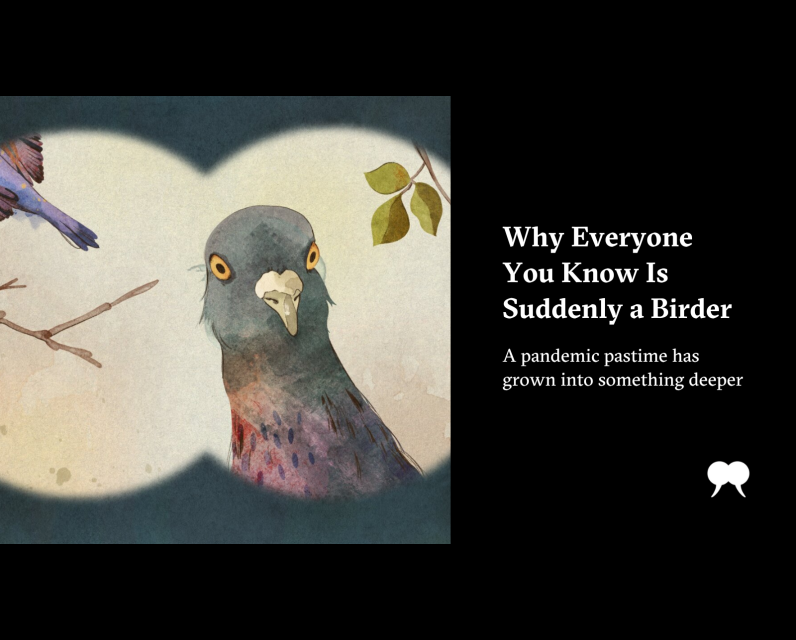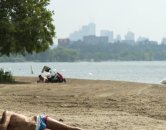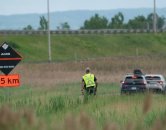Source Feed: Walrus
Author: Julia Zarankin
Publication Date: July 11, 2025 - 06:30
Why Everyone You Know Is Suddenly a Birder
July 11, 2025

I can trace my personal descent into what science journalist Ed Yong calls “birder derangement syndrome” back to when I started referring to myself as a “sewage lagoon aficionado.” It wasn’t just that I had taken to setting my alarm for 4 a.m. during spring migration to be in position just in time for the peak dawn chorus, or that I was cancelling all non-bird-related social engagements in May, but that I had started planning vacations around proximity to wetlands and sewage lagoons to maximize roving insect populations, which translate into bird sightings.
I wasn’t always like this. I used to be what some might call a “normal person”—waking up at civilized hours, going to the movies, and wearing something more presentable than ultraviolet-safe hiking pants with a bird-themed T-shirt, trail shoes, and a Tilley hat. But I’ve realized that I’m at my best when I’m birding: curious, my sensory antennae on high alert, attuned to the nuance and detail of the world around me, fully present. I agree with Yong that birding is “more meditative than meditation.”
All of that is true. And then I get a notification from the Ontario Rare Bird Alert on the Discord app on my phone, announcing that my nemesis bird—the blue grosbeak—has just been spotted about an hour’s drive from Toronto. Any semblance of Zen birding and embracing the philosophy of calm appreciation dissipates, and I start scheming about how to postpone work meetings to carve out a window to get to the bird as quickly as possible. For me, birding is an emotional business, and technology has only increased the sense of FOMO I now feel because, for the first time, we know exactly what we’re missing.
Birding has experienced a surge in popularity over the past decade, in part due to the pandemic, which forced so many of us outside (or to stare through our windows at the world outside) while also illuminating the inequities around access to outdoor spaces. Statistics Canada estimates that in 2021, 11 percent of households participated in birdwatching, and that number is undoubtedly higher today. Technology has certainly made birding more accessible: the free Merlin Bird ID app, developed by Cornell Lab of Ornithology, identifies birds by photos and songs with incredible (but not total) accuracy; the free Audubon Bird Guide app helps build birding skills through identification filters and pointers; Larkwire facilitates learning birdsong through interactive quizzes; and logging sightings in the app eBird turns amateur birders into citizen scientists. In 2024 alone, the Merlin app welcomed 7.5 million new users.
Yet, although these tools have certainly made the process of identifying a bird easier, they haven’t eliminated the barriers to feeling at ease in the bird community, which, like any subculture, has its own lingo. Let’s face it, hearing a bunch of birders throw around jargon such as FOY (first of year), LBJ (little brown job), the ubiquitous “sp.” (short for “species”), the infelicitous jizz (basically a bird’s vibe or a general impression of size and shape) can be intimidating. Add to that the puns (“loonar eclipse!”), the optics talk, the multi-pocketed vests, and fancy binoculars, and newcomers might wonder if they’ll ever belong.
Canadian American nature cartoonist Rosemary Mosco’s new book, The Birding Dictionary, offers that all-important first step to belonging. I discovered her comics a decade ago, and I marvelled at the way her work spotlights not only the curious birds themselves but also the people who watch them with fervour, awe, and a touch of madness. And by turning the binoculars around, one clearly recognizes how bizarre our own flock can look to people from the outside.
In 2021, Mosco leapt to national fame as an apologist for the much-maligned and misunderstood peristeronic creatures in her brilliant A Pocket Guide to Pigeon Watching. Her writing and comics are whimsical while backed up by rigorous science, offering a new and much-needed approach to science communication: inviting, accessible, emotionally engaging, and personal when it comes to the fragility of our planet, climate change, and the ecological losses we face.
The Birding Dictionary’s 200-plus entries are much more than a series of definitions; they are a manual for the quirks and peculiarities of what it means to navigate the world through the eyes of a birder—where people “dip” (miss a bird sighting, despite best efforts), “pish” (vocalize bird sounds), eat “lifer pie” (eat a pie in celebration of seeing a particular species for the first time in your life), and examine owl pellets with glee and astounding regularity. Mosco not only demystifies birding talk (“sp.” is pronounced “‘spuh,’ like you’re trying to eject an errant gnat from your mouth”) but also cautions against using terminology as the litmus test of a real birder. In her entry for “Canadian Goose,” a frequently used incorrect term for Canada goose, Mosco asks, “Should we all take the time to lose ourselves in the pure joy of watching wildlife, regardless of whether we’re using the appropriate terminology?”
The definition of “birder” is where Mosco announces her commitment to dispelling the elitist connotations often associated with birdwatching. First off, she insists, there is no correct way to bird. “If you love observing birds, you’re a birder,” she writes. “If you’re new to the hobby, you’re a birder. If you love birds but have never heard any of the slang or scientific jargon in this book before, you’re a birder. If you’re the type of person who judges other birders for not knowing enough about birds, you’re still a birder, but you’re also an ass.” This isn’t just paying lip service to diversifying the birding community; it’s pointing to a dire necessity since North America has lost almost 3 billion birds since 1970, and the 2024 State of Canada’s Birds report, which tracks avian population trends over the past half century, shows catastrophic losses in several bird families.
There is so much we are capable of doing to save and protect birds if we have enough people—birders—advocating and fighting on their behalf. Though Mosco’s dictionary is lighthearted at first glance, the underlying message of expanding the bird community is nothing short of a call to action, so that we might always continue to use the verb “bird” as “the worthy act of beholding a bird and giving it the time and attention it deserves.”
For some, the fear of incorrectly identifying birds can be alienating. Mosco is quick to normalize misidentification and insists that “[y]ou should never feel bad for misidentifying a bird. If anything, you should blame the birds for stubbornly refusing to wear name tags.” To underscore this point, she shares several misidentifications among experts, including one who mistook a magnificent frigatebird for an “Osprey carrying an oddly shaped stick.” An antidote to smugness, birding keeps us—experts and novices alike—forever humble.
Among other things, Mosco might even make you want to try your hand at attracting birds by pishing. “When you pish, one of two things will happen: either a spectacular flock of songbirds will surround you, filling your heart with joy, or absolutely nothing will happen and your pishes will sputter out until you stand in silent humiliation.” Birding isn’t just about getting to know the birds; it’s also about the practice of noticing, which feels inseparable from joy. Even—and especially—if they’re just pigeons. The post Why Everyone You Know Is Suddenly a Birder first appeared on The Walrus.
The alert issued Friday morning says daytime highs for areas between Windsor and Cornwall are expected to range from 29 C to 32 C.
July 11, 2025 - 13:01 | Globalnews Digital | Global News - Ottawa
July 11, 2025 - 12:52 | | CBC News - Canada
A Montreal man is suing a funeral home because he claims they cremated his late mother without his permission.
July 11, 2025 - 12:36 | Dan Spector | Global News - Canada




Comments
Be the first to comment